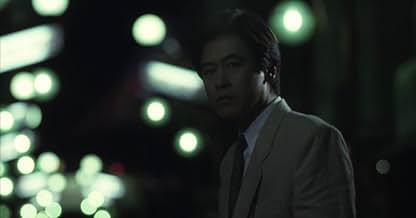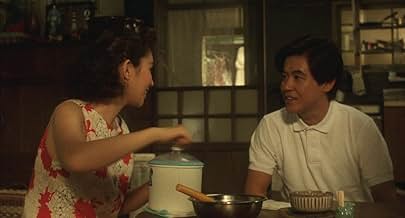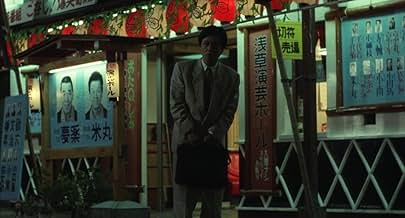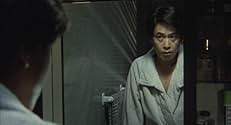VALUTAZIONE IMDb
7,1/10
605
LA TUA VALUTAZIONE
Dopo il divorzio, uno scrittore si riunisce coi fantasmi dei genitori che gli prosciugano le energie vitali quando appaiono. Deve andare avanti o rimanere intrappolato nel passato.Dopo il divorzio, uno scrittore si riunisce coi fantasmi dei genitori che gli prosciugano le energie vitali quando appaiono. Deve andare avanti o rimanere intrappolato nel passato.Dopo il divorzio, uno scrittore si riunisce coi fantasmi dei genitori che gli prosciugano le energie vitali quando appaiono. Deve andare avanti o rimanere intrappolato nel passato.
- Regia
- Sceneggiatura
- Star
- Premi
- 13 vittorie e 11 candidature totali
Bengal
- Taxi Driver
- (as Bengaru)
Recensioni in evidenza
This is probably the most subdued Nobuhiko Obayashi film I've seen so far (granted, we're only talking about six or seven movies), and it only has occasional stylistic flourishes that are reminiscent of his wilder/crazier films. I kind of liked him dialing it back for this story; the approach worked very well, though one nitpick might be some of the scene transitions where the image paused and awkwardly shrunk looked a little cheesy.
It was great to watch this fairly soon after seeing and loving All of Us Strangers, with both adapting the same source material in different ways. The premise and main four characters carry over in both, but there are enough interesting differences to make The Discarnates worth watching for anyone who liked All of Us Strangers, and vice versa.
The more recent adaptation of Taichi Yamada's novel Strangers probably affected me more emotionally, but I still found The Discarnates moving in parts and overall engaging, both for the familiar and unfamiliar beats contained within. It's very good, and I hope it gets a little more well-known in the wake of this newer adaptation (I didn't even realize the story of All of Us Strangers had already been made into a film, and maybe others are in the same boat).
It was great to watch this fairly soon after seeing and loving All of Us Strangers, with both adapting the same source material in different ways. The premise and main four characters carry over in both, but there are enough interesting differences to make The Discarnates worth watching for anyone who liked All of Us Strangers, and vice versa.
The more recent adaptation of Taichi Yamada's novel Strangers probably affected me more emotionally, but I still found The Discarnates moving in parts and overall engaging, both for the familiar and unfamiliar beats contained within. It's very good, and I hope it gets a little more well-known in the wake of this newer adaptation (I didn't even realize the story of All of Us Strangers had already been made into a film, and maybe others are in the same boat).
I love Obayashi because of Hausu... but after 5 watchings over a decade, I said - Let's see if he made anything else. And so far there are gems, middling... but the middling films float upward with reflection. My score is 8 of 10 here.
Fans of the hyper, superlative and surreal films like Hausu and Labyrinth of Cinema will not get their fill here.
But those who detect the underlying Japanese knack for subtle depths, for slow and calming profoundness, will be rewarded as the film ends.
I figured the pacing wasn't great as I watched - this film seems to tug at you but not make clear at ALL what it is doing.
Another review called the protagonist "bland" but I wouldn't say so. Without going Tom Cruise, there were a few moments that really moved me for this character - however certain elements are significantly underdrawn, and this is the inverted narrative of the film that feels like a pacing problem. The viewer is constantly getting pinged with a realization that they feel might have been made clear sooner. You think, even plain reality would have made this distinction apparent sooner.
But that is the nature of Obayashi. The films are highly imaginative and play chess against you with made up pieces and rules you never heard in your life.
We're all Netflix-minds now, but when this film came out I am quite sure it met its moment and bloomed exquisitely. So ultimately, this is not "we've been at the bars and we want a midnight movie!" material like Hausu. This is "Dinner was great and I want a kind of meditative, kind of underground-feeling art experience."
Enjoy - like I did!
Fans of the hyper, superlative and surreal films like Hausu and Labyrinth of Cinema will not get their fill here.
But those who detect the underlying Japanese knack for subtle depths, for slow and calming profoundness, will be rewarded as the film ends.
I figured the pacing wasn't great as I watched - this film seems to tug at you but not make clear at ALL what it is doing.
Another review called the protagonist "bland" but I wouldn't say so. Without going Tom Cruise, there were a few moments that really moved me for this character - however certain elements are significantly underdrawn, and this is the inverted narrative of the film that feels like a pacing problem. The viewer is constantly getting pinged with a realization that they feel might have been made clear sooner. You think, even plain reality would have made this distinction apparent sooner.
But that is the nature of Obayashi. The films are highly imaginative and play chess against you with made up pieces and rules you never heard in your life.
We're all Netflix-minds now, but when this film came out I am quite sure it met its moment and bloomed exquisitely. So ultimately, this is not "we've been at the bars and we want a midnight movie!" material like Hausu. This is "Dinner was great and I want a kind of meditative, kind of underground-feeling art experience."
Enjoy - like I did!
Although 'discarnate' was a new word to me, I see it is defined in the dictionary as, 'disembodied', so although seeming a little clumsy as a film title, not totally inaccurate, although they probably should have stuck to the singular. I read 'Strangers' by Taichi Yamada, earlier this year and pondered how difficult it might be to film, not aware that it had indeed already been so filmed twenty years ago. The splendidly spooky book (Ijin-tachi to no Natsu, in the Japanese) was originally published in Japan in 1987 but only translated into English recently. The film itself is very faithful to the book and overcomes the difficulties I foresaw fairly creatively but mainly with the use of shadow. The middle section of the film seems a little flat, whereas in the book we are in the midst of deeply disturbing images both of the main character's deterioration and his friend's 'scars', the film plays this in a more straightforward manner. Nevertheless the film is well paced, has a warmth as well as worry to it and nobody could be disappointed by the rousing ending. A difficult book to adapt, but done surprisingly well.
The Discarnates is a very touching supernatural tale from director Nobuhiko Ôbayashi, who also gave us the hugely entertaining, crazy cult classic Hausu (1977).
The film's central character is recently divorced TV drama writer Hidemi Harada (Morio Kazama), who learns that his friend and work colleague is planning to date his ex-wife. Not in a good place, Harada is rather abrupt when his only neighbour, a lonely young woman named Kei (Yûko Natori), knocks on his door looking for company. He sends her packing.
The film then develops into a melancholy ghost story, as Harada decides to visit the place where he grew up, before his parents were tragically killed by a truck. Visiting a vaudeville theatre, the writer encounters his dead father and is also reunited with his mother. Over the following days, he spends time with his parents, experiencing much happiness.
Things are also going well for him at home: he apologises to Kei for his rudeness and soon begins a passionate affair with the woman, who is insecure about the burn scars that she has on her chest (meaning that Harada can only make love to her from behind!).
Eventually, Harada tells Kei about his trips to see his dead parents, something that alarms the young woman: she tells him that his visits are draining his lifeforce, and reveals to him his haggard reflection in a mirror. He must tell his mother and father that he can no longer see them or he will die...
Harada making the journey to the place of his childhood reminds me a lot of one of my favourite Twilight Zone episodes, Walking Distance, and like that story, the message in The Discarnates is 'don't live in the past, make the most of the present'. Through his experience with the ghosts of his parents, and his relationship with Kei, Harada comes to terms with his grief, learns to appreciate life and becomes far more content with his lot. It's heartwarming stuff, but Obayashi also has a surprise in store for the ending, which adds a touch of horror and plenty of gushing blood. I'm not going to ruin it for you but it's a lot of fun.
8/10.
Based on the 1987 novel Strangers by Taichi Yamada, which was also turned into the film All Of Us Strangers in 2023 (not seen that one yet -- I wonder how it compares...).
The film's central character is recently divorced TV drama writer Hidemi Harada (Morio Kazama), who learns that his friend and work colleague is planning to date his ex-wife. Not in a good place, Harada is rather abrupt when his only neighbour, a lonely young woman named Kei (Yûko Natori), knocks on his door looking for company. He sends her packing.
The film then develops into a melancholy ghost story, as Harada decides to visit the place where he grew up, before his parents were tragically killed by a truck. Visiting a vaudeville theatre, the writer encounters his dead father and is also reunited with his mother. Over the following days, he spends time with his parents, experiencing much happiness.
Things are also going well for him at home: he apologises to Kei for his rudeness and soon begins a passionate affair with the woman, who is insecure about the burn scars that she has on her chest (meaning that Harada can only make love to her from behind!).
Eventually, Harada tells Kei about his trips to see his dead parents, something that alarms the young woman: she tells him that his visits are draining his lifeforce, and reveals to him his haggard reflection in a mirror. He must tell his mother and father that he can no longer see them or he will die...
Harada making the journey to the place of his childhood reminds me a lot of one of my favourite Twilight Zone episodes, Walking Distance, and like that story, the message in The Discarnates is 'don't live in the past, make the most of the present'. Through his experience with the ghosts of his parents, and his relationship with Kei, Harada comes to terms with his grief, learns to appreciate life and becomes far more content with his lot. It's heartwarming stuff, but Obayashi also has a surprise in store for the ending, which adds a touch of horror and plenty of gushing blood. I'm not going to ruin it for you but it's a lot of fun.
8/10.
Based on the 1987 novel Strangers by Taichi Yamada, which was also turned into the film All Of Us Strangers in 2023 (not seen that one yet -- I wonder how it compares...).
Natsu up there in the original title = summer, while ijin probably means foreigner in the sense not at all of Westerner, but rather of outsider. Depending on the kanji, there might be a hint also, though it would have to be sarcastic and I'm not sure exactly who about, of mastermind, great man. I'm thinking of Harada's parents or himself as the target, but don't know whether that kind of pun/allusion goes in the language. I sincerely hope ijin isn't used for "zombies" as in the secondary English title here, but even if it is, there must be at least hints of other meanings.
So, here's a film nearly as awkward as the unfortunate English translations of its title. It has three supremely interesting characters, none of them the bland protagonist.
Yuko Natori's Kei, Harada's only nighttime neighbor in a large building of mostly offices, bursts through his door one night, clearly vulnerable, alone, feeling the emptiness of the building, perhaps suffering from drink but clearly damaged somehow beyond that. Though barely a sketch, and a bit older, she suggests the legion of slightly off young women who hound Haruki Murakami's protagonists. When dull Harada gently slams the door in her face, viewers can't help but feel a loss. Later of course, there's the quirk about her front: no face to face love-making. The mystery wrought by her ever-present clothing, in combination with her aggressiveness, creates a fine-toned sensuality.
Hardly less sensual is Fusako, Harada's mother. Introduced after Kei, perhaps as lonely as Kei but in a different sense, roughly the same age as Harada and Kei, her aggressive doting on her son startles at first. She seems a counterpoint, a reflection, even a rival of Kei. I think early on, sweltering in the heat of the title's summertime, she was wearing just a slip. At one point she climbs onto Harada's back to reach a high shelf and falls into his arms. This moment takes a brief eternity to pass.
The third finely turned character is Harada's father, Hidekichi. Somehow -- and no doubt the lighting, ambient sound, and cramped yet expansive bustling street set help -- he embodies an innocence that the film's creators have chosen to give to his times. Bare-armed, swaggering, lethargically energetic, oozing a hospitality that's actually quite cunning but appears naive, he could be any child's workingman father or any "Postman Rings Twice" film's husband. Even though there's little or nothing of the cliché cuckold plot here, without him the two fleetingly sublime women characters wouldn't resonate as they do.
So, here's a film nearly as awkward as the unfortunate English translations of its title. It has three supremely interesting characters, none of them the bland protagonist.
Yuko Natori's Kei, Harada's only nighttime neighbor in a large building of mostly offices, bursts through his door one night, clearly vulnerable, alone, feeling the emptiness of the building, perhaps suffering from drink but clearly damaged somehow beyond that. Though barely a sketch, and a bit older, she suggests the legion of slightly off young women who hound Haruki Murakami's protagonists. When dull Harada gently slams the door in her face, viewers can't help but feel a loss. Later of course, there's the quirk about her front: no face to face love-making. The mystery wrought by her ever-present clothing, in combination with her aggressiveness, creates a fine-toned sensuality.
Hardly less sensual is Fusako, Harada's mother. Introduced after Kei, perhaps as lonely as Kei but in a different sense, roughly the same age as Harada and Kei, her aggressive doting on her son startles at first. She seems a counterpoint, a reflection, even a rival of Kei. I think early on, sweltering in the heat of the title's summertime, she was wearing just a slip. At one point she climbs onto Harada's back to reach a high shelf and falls into his arms. This moment takes a brief eternity to pass.
The third finely turned character is Harada's father, Hidekichi. Somehow -- and no doubt the lighting, ambient sound, and cramped yet expansive bustling street set help -- he embodies an innocence that the film's creators have chosen to give to his times. Bare-armed, swaggering, lethargically energetic, oozing a hospitality that's actually quite cunning but appears naive, he could be any child's workingman father or any "Postman Rings Twice" film's husband. Even though there's little or nothing of the cliché cuckold plot here, without him the two fleetingly sublime women characters wouldn't resonate as they do.
Lo sapevi?
- QuizRemade as All of Us Strangers
- ConnessioniFeatures Carmen ritorna a casa (1951)
- Colonne sonoreO mio babbino caro
by Giacomo Puccini
I più visti
Accedi per valutare e creare un elenco di titoli salvati per ottenere consigli personalizzati
- How long is The Discarnates?Powered by Alexa
Dettagli
Contribuisci a questa pagina
Suggerisci una modifica o aggiungi i contenuti mancanti

















